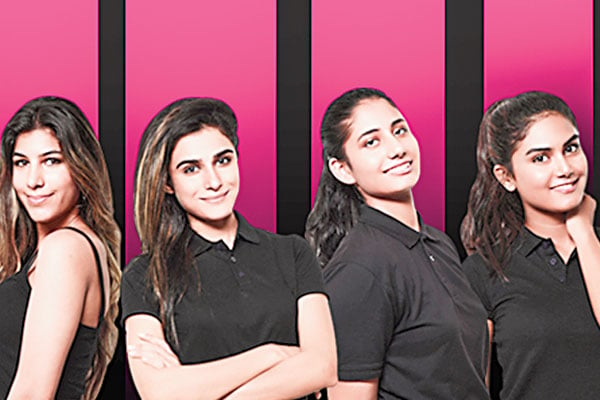Running for its third season, Veet’s platform for women has dramatically changed, or at least has tried to be different. Miss Veet Pakistan, previously known as Veet Miss Supermodel, isn’t looking for supermodels anymore. The search is far bigger and wider. But how much bigger? At this point, it can be seen that the show has tried to change its theme but what is unclear is what all it exactly entails.
The judging panel hosts a bevy of industry giants: Tapu Javeri, Aamina Sheikh, Aisha Khan and Fayeza Ansari (who is a mentor
for the participants).
INSTEPREPORT
The Veet show gets a little confusing as the format shifts from Miss Supermodel to Miss Pakistan.
Running for its third season, Veet’s platform for women has dramatically changed, or at least has tried to be different. Miss Veet Pakistan, previously known as Veet Miss Supermodel, isn’t looking for supermodels anymore. The search is far bigger and wider. But how much bigger? At this point, it can be seen that the show has tried to change its theme but what is unclear is what all it exactly entails.
Maha Changez, the brand manager for Veet, says that the competition now wants to focus on bringing more well rounded personalities into the limelight, giving them a platform to pursue their dreams. But what kind of dreams? If the girls coming in aren’t models, then what professions can they delve into once they participate, or win? “They can be anything they want to be. They can be business women or entrepreneurs. We will be focusing on grooming and training them to make them more confident,” Changez told Instep.

After extensive auditions, four finalists have been selected from Karachi: Saara, Fizza, Sameen and Ramsha.
Here is where it becomes further confusing. While the brand maintains that the new show will polish girls and work on their vocational skills to give them the confidence to follow any profession they’d like, it isn’t clear why the panel consists of judges from one very specific industry. There are three main judges and one mentor on the show: Tapu Javeri, Aisha Khan, Aamina Sheikh and Fayeza Ansari, respectively. Why couldn’t the panel hold someone from another profession then, for instance a business woman who could really help by bringing her insights to the girls? Or a nutritionist? Or anyone other than models and actresses and fashion photographers? The judges on board are extremely accomplished individuals, no one is denying that, but it is a very restrictive panel.
Also, the format of the show is divided in a manner where the participants go through certain challenges in order to win the grand prize: a year-long contract as Veet’s brand ambassador. Every girl had to participate in every challenge; there was no way someone could say no. Also, as revealed by the Veet team, the girls had not been told in advance regarding what all they would have to do once they reached Sri Lanka, where the entire show has been shot. It doesn’t exactly make sense to make a girl participate in fashion photo shoots and beauty rounds if her goal isn’t to be a model, and she wants to be a martial arts expert or a businesswoman instead.
The show has left us confused but also curious. After watching the first episode, many promising young women have come forward. The show even saw diversity as many mothers showed up to the auditions but were disqualified because they did not have valid passports, a pre-requisite for the show. Four finalists have been decided from Karachi - Saara, Fizza, Sameen and Ramsha - and it is clear that all of them have been selected for various reasons. Some of them are clearly inclined towards modeling, while others were chosen for their endearing personalities.
Perhaps the whole point of Miss Veet Pakistan is to encourage girls to come out of their shells and believe in themselves to go on to do bigger and better things, and maybe the format of the show will help the girls achieve just that. Maybe it’s too soon to tell because we have only seen the first episode so far. Let’s hope the show is able to achieve what it has set out to do.